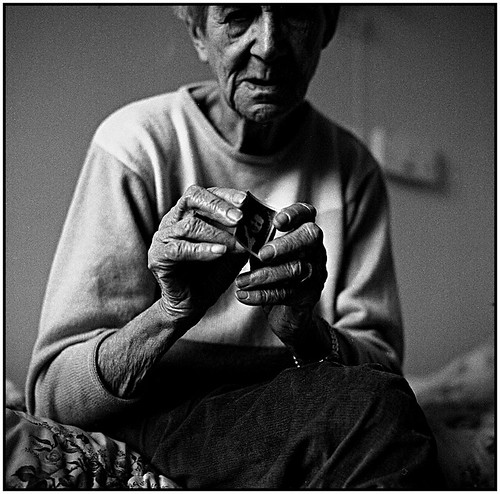"And the highest enjoyment of timelessness - in a landscape
selected at random - is when I stand among rare butterflies and their
food plants. This is ecstasy, and behind the ecstasy is something else,
which is hard to explain. It is like a momentary vacuum into which
rushes all that I love. A sense of oneness with sun and stone. A thrill
of gratitude" - Vladimir Nabokov
John Eagan holds the dusty wings of a monarch butterfly between his
fingers, just before he releases it into what the Rev. Ray Gurney has
named a "transformation garden."
"Did I do that well enough?" Eagan asks Gurney.
"That was beautiful, beautiful, John."
Eagan, who is 33, identifies with the weeks-old monarch: after time
as an egg, a caterpillar and a chrysalis, the butterfly has assumed its
final identity; after a breakdown and 15-month recovery at the Milwaukee
County Behavioral Health Complex, Eagan has begun to counterpoise his
life.
This is the second year that the facility's staff is helping patients
- adults and children - raise and release monarchs. It was Gurney, the
complex's spiritual integration coordinator, who approached its
spiritual committee with the idea. For patients who have had difficulty
with organized religion, the program may offer an alternative.
To Gurney, the miraculous transformation of the compact chrysalis to
winged monarch "represents nature, which has nothing to do with an
organized religion, but it's very spiritual and it means a lot to
people," he says.
He collects monarch eggs from under the leaves of milkweed plants.
They grow in the complex's triangular courtyard, which he hopes will
soon be registered as an official monarch way station with the
University of Kansas' Monarch Watch project.
Gurney then places the pinhead-sized eggs he's assembled in a display
case in the facility's main hallway. From inside the shells, hungry
caterpillars emerge. When they've eaten enough milkweed to outgrow five
sets of skin, the larvae hang upside down from their back ends and curl
up into letter "Js." They unzip their last black, white and yellow
outfits, revealing jade-green chrysalides. Beneath those ornamental
coverings, the monarchs dissolve and reform themselves into maturity.
Gurney carefully ties the chrysalides onto a branch in the display
case and he waits for them to darken with the butterflies inside. When
the monarchs issue from their casings, they're fragile. Their wings are
shriveled. As fluid drains into their wings, they expand, and soon the
butterflies need no anchoring.
On Monday, before liberating two monarchs, adult patients at the
behavioral health complex gather to watch a video called "Butterfly
Sunshine: A Monarch Meditation" and discuss what the butterflies
symbolize to them.
"The symbol is like he's free!" says Zenova Walker, who was released
from the facility only a week earlier. After Eagan lets the first
butterfly go, she releases the second. Patients gathered behind her
clap.
"I feel like I'm free of all the suicide attempts that God had arranged for me to live," Walker says.
Now 26, she's tried to commit suicide 11 times since she turned 16.
In June, she swallowed 30 Tylenol pills after her cousin died of smoke
inhalation in his basement.
If God hadn't wanted her to survive, Walker reasons, "He'd let me die
the other times I tried to kill myself, so there's a purpose for
everyone to live."
With therapy and medication for her schizophrenia and her bipolar
disorder, Walker is feeling her wings for the first time. She feels
she's at a turning point in life.
At the very least, Gurney hopes the butterflies have taught Eagan and
Walker that transformation is part of life's cycle. It's tumultuous -
and normal.






 Appreciation is an over-used term in our lifestyle and by that I mean its significance to our life has been properly diluted. If we can fall below our conclusions and look at the technology we’ll see that an improving quantity of analysis is displaying that gratitude has a important impact on our overall wellness and well-being. Something apparently minor as keeping track of our delights during the day can actually create us experience like our life are actually better off.
Appreciation is an over-used term in our lifestyle and by that I mean its significance to our life has been properly diluted. If we can fall below our conclusions and look at the technology we’ll see that an improving quantity of analysis is displaying that gratitude has a important impact on our overall wellness and well-being. Something apparently minor as keeping track of our delights during the day can actually create us experience like our life are actually better off.